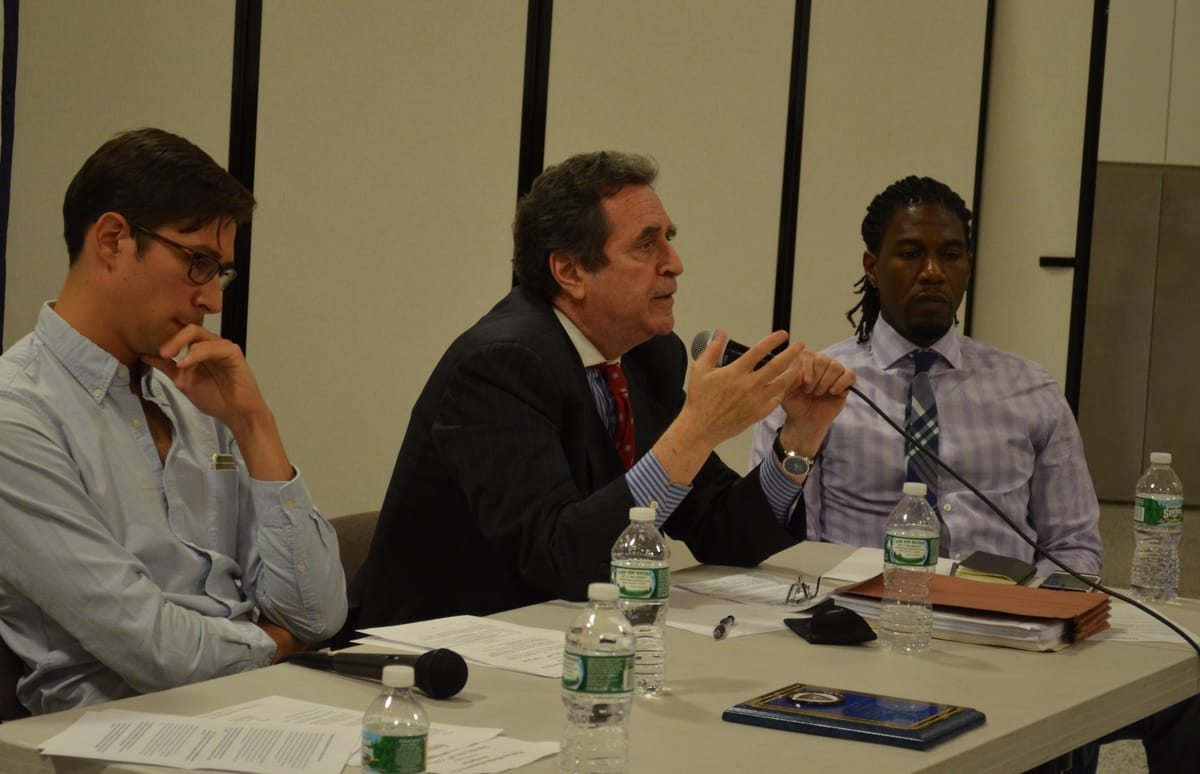Civic Groups Must Drive Big Money Out Of Politics, Panelists Argue


Senator Bernie Sanders’ “political revolution” has certainly helped push the topic of big money in politics back into the national zeitgeist. But this year, the issue seems to be especially close to home for New Yorkers, who are once again scrutinizing the incestuous relationship between their elected officials and elite political donors.
Already, two of the state’s most powerful legislators have been sidelined this year as a result of U.S. Attorney Preet Bharara’s investigation into Albany corruption. Meanwhile, a top Manhattan consulting firm was fined almost $26,000 dollars last week for failing to maintain a firewall between an animal rights advocacy group and the campaigns of two City Councilmembers. And revelations by Politico that Mayor Bill de Blasio’s political action committee, Campaign for One New York, accepted millions from donors who had contracts with the city, has cast doubt on the authenticity of his progressive agenda.
It is in this climate, when all levels of government appear to be awash in money, that the Madison-Marine-Homecrest Civic Association hosted a panel discussion Thursday night about how to tip the scales of power in favor of working-class people.
The panel was moderated by City & State’s opinion editor Nick Powell. Speakers included former director of the NY Civil Liberties Union Norman Siegel, the Center for an Urban Future’s senior researcher Adam Forman, and City Councilman Jumaane Williams.
“If civic groups like yours and others start making demands about campaign contributions, we might get some incremental change,” Siegel argued. “Civic groups have a lot of leverage, whether you know it or not, because politicians are followers. Lead them and they will follow. You know why? They want the hundreds of votes that you’re going to bring them.”
Speakers advanced ideas such as free radio and TV time for political candidates, capping campaign war chests so all candidates have the same amount of money, and greater transparency as means for leveling the playing field.
“You can never completely take money out of politics. People need money to get elected. But we have to find a way to balance it out,” explained Williams. “There are always access points. The president of the Madison-Marine-Homecrest Association is going to be heard by elected officials. But you have to organize a lot to counteract those big checks.”
Forman said elite campaign donors, like real estate moguls, are paying for access to politicians. The extra attention from lawmakers gives them an advantage in advancing their interests.
“Once you have that access, then you can provide the facts that support your side. You can persuade and cozy up to politicians and you can influence them,” he said. “So it’s important that we have equal access so that people of all perspectives can persuade candidates and influence their policy.”
Siegel argued that big donations buy more than access, they buy favors. He argued the large real estate contributions to Campaign for One New York, de Blasio’s PAC, undercut the mayor’s rhetoric on affordable housing.
The mayor’s affordable housing plan has been criticized for being a giveaway to developers. Some, including Comptroller Scott Stringer, point out that much of the “affordable” housing units created in the last year are still out of reach for low-income residents. And the mayor declined this summer to fight for labor union requirements in 421a, the tax break subsidizing affordable housing.
“When I was growing up, I understood that nothing comes free. There are always strings attached,” said Siegel. “They are not just writing checks because they believe a politician is right on the issues. In fact, sometimes they give to both candidates, to democrats and republicans. Why do they do that? To cover their you-know-whats.”
Ed Jaworski, president of the civic association, said the idea for the event began percolating last spring after he attended a hearing on the mayor’s new zoning plan to increase affordable housing stock, which is currently being reviewed by community boards throughout the city. Jaworski said he was concerned the plan was tilted in the interests of real estate developers.
“This thing is being driven by big money. So I thought: Let’s put together a panel discussion on this,” he explained.
The first person Jaworski invited, who declined the invitation, was Senator Bernie Sanders, whose campaign was just getting off the ground and making a lot of noise about money in politics. But most importantly, Jaworski said, Sanders grew up in the area.
“The reason we invited him to be here is not so much because of his politics, but we found out he grew up on East 26th street, near Kings Highway, and he went to Madison High School and Brooklyn College,” he said.
All of the panelists had good things to say about Sander’s message.
“Money is not the only criteria for winning elections,” said Siegel. “What I like about Bernie Sanders is that he said the way you challenge things is you mobilize and organize. If you do that, you can sometimes counter big money.”



